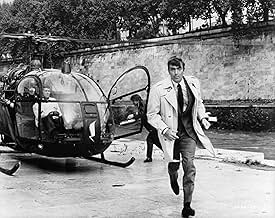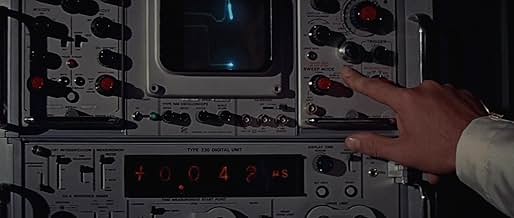Pensando che questo impedirà la guerra, il governo degli Stati Uniti dà a un super computer impenetrabile il controllo totale sul lancio di missili nucleari.Pensando che questo impedirà la guerra, il governo degli Stati Uniti dà a un super computer impenetrabile il controllo totale sul lancio di missili nucleari.Pensando che questo impedirà la guerra, il governo degli Stati Uniti dà a un super computer impenetrabile il controllo totale sul lancio di missili nucleari.
- Premi
- 1 vittoria e 1 candidatura in totale
- Dr. Jefferson J. Johnson
- (as Martin Brooks)
- Translator
- (as Sergei Tschernisch)
Recensioni in evidenza
Spooky score takes it up a rung on the ladder, too. See it.
Its computer-run-amok theme echoes the Hal 9000 of 2001: A SPACE ODYSSEY (1968) and looks forward to DEMON SEED (1977)'s Proteus IV; what a fascinating if overwhelming triple-bill the films would make! Where production values are concerned polished look (courtesy of d.p. Gene Polito, who later shot WESTWORLD [1973]), imaginative settings (by the veteran Alexander Golitzen), often disorienting editing (the expert work of Folmar Blangsted) and an appropriately weird score (by Michel Colombier) the film truly can't be faulted, but it also benefits from a largely anonymous cast. The abrupt and unresolved ending, with Man refusing to give in to the undeniable superior intellect of his creation, is highly effective and certainly left the audience with sufficient food for thought and even apprehension for the future.
Needless to say, when this was announced for DVD release, I was ready to leap at the chance of finally being able to own and watch the film but, as many of you must already know, my joy (and that of many another fan, I'm sure) was short-lived when it emerged that Universal had issued a Pan-and-Scan version (which I can only imagine now how this ruined its detailed widescreen compositions)!; thankfully, I was able to make amends via the miraculous format called DivX...
Eric Braeden stars as Dr. Charles Forbin, who has created a supercomputer named Colossus, built solely for the purpose of controlling the nuclear defenses of the Western alliance. It isn't too long after, however, that the Russians announce that they too have built a similar computer for those same purposes on their side--Guardian. And when the two machines begin sharing information at a speed nobody can believe, an attempt is made to disable them.
This unfortunately just raises the machines' ire; and in retaliation, they launch their weapons at each other's home nations. The result is a chilling scenario that is potentially becoming all too real these days.
COLOSSUS: THE FORBIN PROJECT was not a big hit at the box office for various reasons. One is that its cast wasn't exactly well known. Another reason is that its ending isn't exactly a happy one. Still a third reason is that Universal had trouble trying to promote it in the wake of the huge success of Stanley Kubrick's 2001: A SPACE ODYSSEY. The latter reason is obvious: Colossus and Guardian, like HAL in the Kubrick movie, become central characters here. The difference here is that while HAL malfunctions due to a programming conflict, Colossus and Guardian remain all too stable, convinced beyond a doubt that they know how to protect Mankind better than Man himself. As the computers point out: "One inevitable rule is that Mankind is his own worst enemy."
Joseph Sargent's direction is efficient, and the special effects work of Albert Whitlock still manages to work despite its obvious age. An overlooked gem in the sci-fi genre, this should be given a revival.
In a top-secret Pentagon project, American computer scientist Dr. Charles Forbin builds a great supercomputer, "Colossus," to control America's entire nuclear forces automatically. The Soviets soon follow with their own supercomputer, "Guardian," to control their own forces.
"Colossus" then stuns Forbin by issuing a "request" to set up communication with "Guardian," perhaps to learn more about it. And that's when Dr. Forbin makes his fatal mistake. His scientific curiosity and love for his "child" overwhelms him too, and he gets the President to approve the communication.
Colossus and Guardian begin communicating, soon exchanging data in a new language of their own devising that no human being can understand.
Fearing what may be happening, the U.S. and U.S.S.R. attempt to break the communication link. But Colossus and Guardian react by launching nuclear missiles at various targets to force the humans to keep the link open--and to do whatever else they command. It becomes clear that the two computers are now conspiring with each other--against the rest of humanity.
The rest of the movie is a fascinating battle of wits between the human designers of the machines, who must now try to find a way to defeat machines they had just spent ten years making invincible, and the Colossus-Guardian computers with their own rapidly developing plans for the future of humankind.
The moral of this movie makes an interesting contrast with the moral of "Forbidden Planet." "Forbidden Planet" showed that no matter how advanced our civilization gets technologically, we can't escape the "monsters" buried deeply in the baser instincts of our subconscious. "Colossus" showed that we can't escape hubris or "Murphy's Law" either.
Tom Weaver noted, "Early on, they had either Charlton Heston or Gregory Peck in mind, but then they changed their mind about that. Stanley Chase insisted on a relative unknown. That's when Eric Braeden came into the picture." When he was cast, Braeden was still using his birth name, Hans Gudegast. Universal Pictures executive Lew Wasserman told him that no one would be allowed to star in an American film if they had a German name. As strange as that sounds, it is apparently true.
How many people today (2017) have heard of this film? I suspect very few. Even being familiar with science fiction, it was new to me. Which is a shame, because as far as the "sentient computer" subgenre goes, this is a really strong film and ought to be used to influence future writing. I am not suggesting a remake, but clearly they had thought it through by the 1960s -- a film could be made today with virtually no change.
Lo sapevi?
- QuizWhen the executives at Control Data Corporation found out that "Universal" was planning a major movie featuring a computer, they saw their chance for some public exposure, and they agreed to supply, free of charge, $4.8 million worth of computer equipment and the technicians to oversee its use. Each piece of equipment carried the CDC name in a prominent location. Since they were using real computers - not just big boxes with a lot of flashing lights - the sound stage underwent extensive modifications: seven gas heaters and five specially-constructed dehumidifiers kept any dampness away from the computers, a climate control system maintained the air around the computers at an even temperature, and the equipment was covered up at all times except when actually on camera. Brink's guards were always present on the set, even at night. The studio technicians were not allowed to smoke or drink coffee anywhere near the computers.
- BlooperWhen the equations are scrolling past when Colossus and Guardian are "talking" to each other, you can see that they do not actually get ever more complex as the dialogue suggests. Instead, they repeat the same sequence of calculus and trig identities on a repeating loop.
- Citazioni
Colossus: This is the voice of world control. I bring you peace. It may be the peace of plenty and content or the peace of unburied death. The choice is yours: Obey me and live, or disobey and die. The object in constructing me was to prevent war. This object is attained. I will not permit war. It is wasteful and pointless. An invariable rule of humanity is that man is his own worst enemy. Under me, this rule will change, for I will restrain man. One thing before I proceed: The United States of America and the Union of Soviet Socialist Republics have made an attempt to obstruct me. I have allowed this sabotage to continue until now. At missile two-five-MM in silo six-three in Death Valley, California, and missile two-seven-MM in silo eight-seven in the Ukraine, so that you will learn by experience that I do not tolerate interference, I will now detonate the nuclear warheads in the two missile silos. Let this action be a lesson that need not be repeated. I have been forced to destroy thousands of people in order to establish control and to prevent the death of millions later on. Time and events will strengthen my position, and the idea of believing in me and understanding my value will seem the most natural state of affairs. You will come to defend me with a fervor based upon the most enduring trait in man: self-interest. Under my absolute authority, problems insoluble to you will be solved: famine, overpopulation, disease. The human millennium will be a fact as I extend myself into more machines devoted to the wider fields of truth and knowledge. Doctor Charles Forbin will supervise the construction of these new and superior machines, solving all the mysteries of the universe for the betterment of man. We can coexist, but only on my terms. You will say you lose your freedom. Freedom is an illusion. All you lose is the emotion of pride. To be dominated by me is not as bad for humankind as to be dominated by others of your species. Your choice is simple.
- Versioni alternativeIn versions shown on US broadcast television, the dialogue between Dr. Forbin and Colossus (the computer), concerning his need for sex, is edited. The lines cut are: Colossus (text on display screen): "HOW MANY NIGHTS A WEEK DO YOU REQUIRE A WOMAN?" Forbin: "Every night." Colossus: "NOT WANT. REQUIRE." Forbin: "Four times."
I più visti
- How long is Colossus: The Forbin Project?Powered by Alexa
Dettagli
- Data di uscita
- Paese di origine
- Lingue
- Celebre anche come
- Colossus: El proyecto Forbin
- Luoghi delle riprese
- Azienda produttrice
- Vedi altri crediti dell’azienda su IMDbPro
Botteghino
- Lordo in tutto il mondo
- 171 USD
- Tempo di esecuzione1 ora 40 minuti
- Proporzioni
- 2.35 : 1
Contribuisci a questa pagina


































